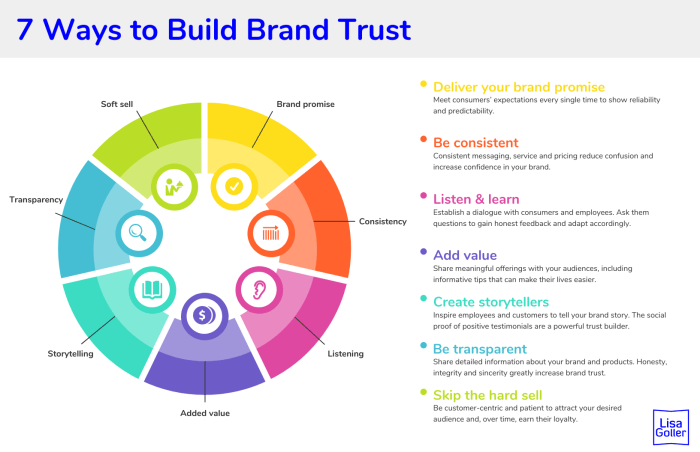Building Brand Trust sets the stage for this enthralling narrative, offering readers a glimpse into a story that is rich in detail with an American high school hip style and brimming with originality from the outset. In a world where consumer relationships are paramount, establishing trust in your brand is the ultimate key to long-term success. Let’s dive into the strategies and tactics that can help you build and maintain brand trust with finesse.
Building Brand Trust

Brand trust in consumer relationships refers to the confidence and belief that customers have in a brand’s ability to deliver on its promises and consistently provide high-quality products or services. It is a crucial factor in establishing a strong connection with customers and fostering loyalty over time.
Importance of Building Brand Trust
Building brand trust is essential for long-term success as it helps companies differentiate themselves from competitors, attract new customers, and retain existing ones. When customers trust a brand, they are more likely to make repeat purchases, recommend the brand to others, and forgive occasional mistakes or shortcomings.
Impact on Customer Loyalty and Retention
Brand trust plays a significant role in customer loyalty and retention. Customers who trust a brand are more loyal and less likely to switch to competitors, even in the face of lower prices or promotional offers. They also tend to be more forgiving of occasional hiccups or issues, as they have confidence in the brand’s overall commitment to quality and customer satisfaction.
Examples of Companies with Strong Brand Trust
– Apple: Known for its innovative products and exceptional customer service, Apple has built a strong brand trust among its loyal customer base.
– Nike: With its focus on quality, performance, and social responsibility, Nike has successfully maintained brand trust and loyalty for decades.
– Amazon: By consistently delivering on its promises, providing excellent customer service, and offering a wide range of products, Amazon has earned the trust of millions of customers worldwide.
Strategies to Build Brand Trust: Building Brand Trust
Building brand trust is essential for the success of any business. Here are some key strategies that can help establish and strengthen trust with your audience:
Transparency
Transparency involves being open and honest about your business practices, products, and services. By providing clear and accurate information, you can build credibility and trust with your customers.
Consistency
Consistency in branding, messaging, and customer experience is crucial for building trust. By delivering a consistent brand image and reliable products/services, you can create a sense of reliability and dependability among your audience.
Authenticity
Authenticity is about being genuine and true to your brand values. By staying true to who you are as a brand and showing your human side, you can connect with your customers on a deeper level and build trust over time.
Effective communication plays a crucial role in building brand trust. By engaging with your audience through various channels and listening to their feedback, you can create a strong connection and demonstrate your commitment to customer satisfaction.
Delivering on promises is another key factor in enhancing brand trust. By consistently meeting or exceeding customer expectations and fulfilling your brand promises, you can build a reputation for reliability and credibility.
Customer reviews and testimonials are valuable tools for building trust. Positive reviews and testimonials from satisfied customers can help establish social proof and credibility for your brand, while addressing negative feedback transparently can show your commitment to continuous improvement and customer satisfaction.
Building Brand Trust Online
In today’s digital age, establishing brand trust online is crucial for the success of any business. With the rise of social media and the importance of a user-friendly website, companies must carefully manage their online presence to build and maintain trust with consumers.
Social Media Role in Building Brand Trust
Social media plays a significant role in building brand trust by providing a platform for direct communication with customers. Companies can use social media to engage with their audience, address concerns, and showcase their values and commitment to customer satisfaction.
- Respond promptly to customer inquiries and feedback on social media platforms.
- Showcase customer testimonials and positive reviews to build credibility.
- Create engaging content that reflects the brand’s personality and values.
User-Friendly Website Contribution to Brand Trust
A user-friendly website can contribute to brand trust by providing a seamless and enjoyable online experience for visitors. A well-designed website that is easy to navigate instills confidence in consumers and reflects positively on the brand’s professionalism.
- Ensure fast loading times and mobile responsiveness for a positive user experience.
- Display clear contact information and product/service details to build transparency.
- Implement secure payment gateways and privacy policies to protect customer data.
Importance of Online Reputation Management
Online reputation management is crucial for trust-building as it involves monitoring and responding to online feedback, reviews, and mentions of the brand. By actively managing their online reputation, companies can address negative feedback promptly and showcase their commitment to customer satisfaction.
- Monitor online reviews on platforms like Google, Yelp, and social media channels.
- Encourage satisfied customers to leave positive reviews and testimonials.
- Respond professionally and empathetically to negative feedback to show dedication to customer service.
Tips for Engaging with Customers Online
Engaging with customers online is essential for establishing trust and building a loyal customer base. By actively listening to customer feedback, responding promptly, and providing valuable content, companies can create meaningful connections with their audience.
- Personalize responses to customer inquiries and feedback to show genuine care.
- Share informative content, promotions, and behind-the-scenes glimpses to keep customers engaged.
- Host interactive sessions, Q&A sessions, and polls to involve customers in brand decision-making.
Maintaining Brand Trust

Maintaining brand trust over time is crucial for the long-term success of any business. It requires constant effort and attention to ensure that customers continue to have confidence in your brand. Let’s explore some strategies for handling potential trust issues or crises and the role of innovation in maintaining brand trust.
Challenges of Maintaining Brand Trust
- Consumer Expectations: As consumer preferences evolve, brands must adapt to meet changing expectations to maintain trust.
- Competition: In a competitive market, brands must differentiate themselves and consistently deliver on promises to stand out and maintain trust.
- External Factors: External events or crises can impact brand trust, making it essential for brands to be prepared to address and overcome challenges.
Strategies for Handling Trust Issues
- Transparency: Being honest and transparent about products, services, and business practices can help build and maintain trust with customers.
- Communication: Open and clear communication with customers during times of crisis can help mitigate trust issues and rebuild confidence.
- Customer Feedback: Actively seeking and responding to customer feedback can help identify and address trust issues before they escalate.
Role of Innovation in Maintaining Brand Trust
Innovation plays a crucial role in maintaining brand trust by showing customers that a brand is committed to evolving and meeting their needs. By continuously improving products, services, and customer experiences, brands can build trust and loyalty over time.
Consistently Delivering Quality Products/Services, Building Brand Trust
- Quality Control: Implementing rigorous quality control measures can help ensure that products and services consistently meet customer expectations.
- Customer Service: Providing exceptional customer service can help address any issues promptly and demonstrate a commitment to customer satisfaction.
- Brand Reputation: Building a strong brand reputation for quality and reliability can help instill trust in customers and encourage repeat business.





